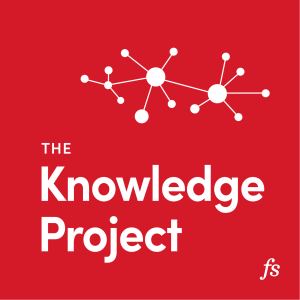
The Knowledge Project with Shane Parrish
Business:Entrepreneurship

#42 Atul Gawande: The Path to Perpetual Progress
 2018-10-02
2018-10-02
The world-renowned surgeon, writer, and researcher Atul Gawande shares powerful lessons about creating a culture of safe learning, the critical difference between a coach and a mentor, and how to ensure constant improvement in key areas of your personal and professional life.
***
Atul Gawande is one of the most impressive individuals I’ve had the pleasure to interview.
He’s one of the world’s top surgeons, a researcher, a prolific writer at The New Yorker, a multiple time best-selling author, and a husband and father to boot.
In this fascinating interview, I’m sure you’ll find that Atul is wise and generous with the lessons he’s learned over a dynamic and accomplished career but also maintains a childlike humility, curiosity and eagerness to learn.
We cover a lot of ground in our discussion, so here are a few excerpts to give you a taste of what you can expect:
I like having a lot of irons in the fire. I like being a jack of all trades and finding the edges between things is often where I have something to add. [My ideas] come from digging in deep enough to understand the gap between what we're aspiring for and the reality of what we're doing and then trying to figure out where the bridge is to narrow that wide gap.
When we all have a piece of care or a piece of a problem, very often none of us can actually see what the outcome is and the owner can't see the function of the system. So then you start finding things like data really matter.
We've been fantastic at breakthrough innovation and we've had no real understanding of follow-through innovation. I think it's partly that the follow through innovation can seem like it's only about nuts and bolts, instead of about recognizing that there are ways that you can actually influence and have control, some degree of control, with regard to the world around you.
For most of human history, for like 99.99% of it, our world was governed largely by ignorance. We did not know the diseases that could afflict the human body or understand them, let alone what to do about them. We didn't understand how societies rose and fell. We didn't understand how economics worked, even in the most basic components.
Even if we were to come to a complete understanding of all the laws of the universe, we won't be able to understand all of the interconnections and all of the particularities and how they all interconnect. We're always making our best prediction and effort to be able to drive that, and so grappling, something about that is deeply human.
In other industries that I've seen that have been able to create that space, you know, engineers on successful teams are able to create, and you can see on teams within the same organization and the same research lab for example, you can see good and bad culture within the teams, but when the leader has made it so people can actually speak up with an equal voice. People from the highest level to the lowest level, they have all been able to contribute, and when that exchange is the way that it occurs, then you know you're there.
The pedagogical theory is you go to Julliard, you get your 10,000 hours of practice with the violin, and you then head out into the world and you're responsible for the rest of your self-improvement along the way. That model is the primary one in professional life, most musicians, in medicine, in teaching, in business.
The other model is mostly out of sports and that's the coaching model, and that says, I don't care if you're Roger Federer, you will have blind spots when it comes to your own improvement and you need a coach. Over time I think what we've been learning is the coaching model beats the teaching model, and has significant advantages.
The fact of rising health care costs is not the problem. What is the problem is, how much of the costs are rising that are not actually connected in any way to value.
I'm ruthless about prioritization. I just try to do no more than a couple of things at a time. I may do something different in a couple of months so it can make it seem like I'm doing a million things at once, but I'm not actually. I'm only doing one thing at a time.
---
For comprehensive show notes on this episode, including a full edited transcript, go to https://fs.blog/podcast/
Is your brain hungry for more? Don't miss out! Sign up for our weekly "Brain Food" at https://fs.blog/newsletter/
Follow @farnamstreet for mind-expanding content.
More Episodes
 2022-09-06
2022-09-06
 2022-07-26
2022-07-26
 2022-06-28
2022-06-28
 2022-06-21
2022-06-21
 2022-06-14
2022-06-14
 2022-05-17
2022-05-17
 2022-04-05
2022-04-05
 2022-02-22
2022-02-22
 2022-02-08
2022-02-08
 2022-01-25
2022-01-25
 2022-01-11
2022-01-11
 2021-12-21
2021-12-21
Create your
podcast in
minutes
- Full-featured podcast site
- Unlimited storage and bandwidth
- Comprehensive podcast stats
- Distribute to Apple Podcasts, Spotify, and more
- Make money with your podcast
It is Free
- Privacy Policy
- Cookie Policy
- Terms of Use
- Consent Preferences
- Copyright © 2015-2024 Podbean.com


